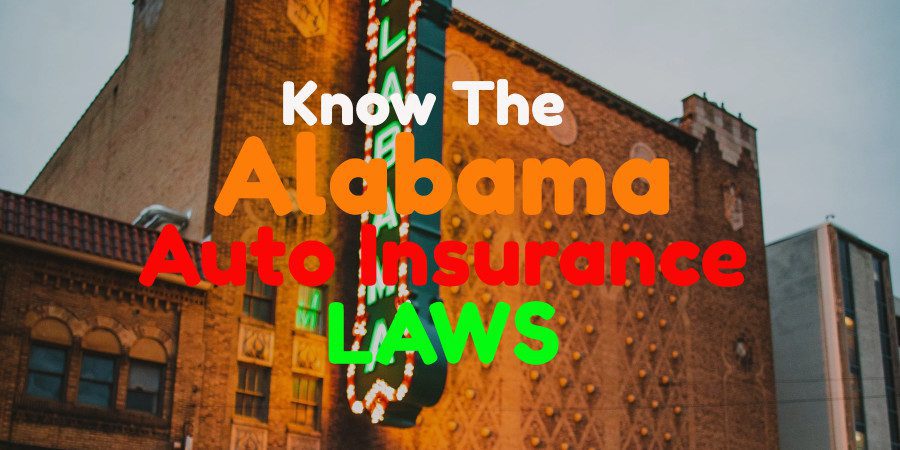
Car Insurance Laws In Alabama in 2023
In Alabama, it is required by law that all drivers have at least the minimum amount of liability insurance coverage. The minimum coverage limits are:
- $25,000 for bodily injury or death of one person in an accident
- $50,000 for total bodily injury or death of two or more people in an accident
- $25,000 for damage to property in an accident
Alabama Car Insurance Requirements
Alabama requires drivers to carry a minimum of 25/50/25 in liability coverage. These are the minimum limits, but higher amounts can better protect you financially after an accident.
Proof of Insurance
Drivers must show proof of insurance when registering a car or if asked by police. You may face fines if you cannot prove coverage.
Additional Coverage
Consider extra coverage like comprehensive, collision, and uninsured motorist to cover more risks.
After an Accident
The at-fault driver’s insurance pays claims. If their limits are exceeded, victims can pursue lawsuits for more compensation.
Key Takeaway
Alabama drivers need adequate coverage to protect themselves in a crash. Minimums may not be enough.
Let me know if you would like me to modify or expand on any part of this revised paragraph. I aimed to improve readability and highlight important keywords related to Alabama car insurance requirements.
Alabama’s “Fault” Car Accident Laws
Alabama uses a “fault” system for car accidents. The at-fault driver must pay for any damages and injuries they cause.
Seeking Compensation
The injured can file a claim with their insurer or the at-fault’s company. If unsuccessful, they may file a lawsuit.
Insufficient Coverage
If the at-fault driver’s insurance does not cover all damages, they may owe the remaining amount personally.
Determining Fault
Fault is not always clear. An investigation with evidence may be needed to assign blame.
Legal Consultation
Speak to a lawyer about your rights and options if in an Alabama accident. They can help maximize your compensation.
Adequate Insurance Is Key
Have sufficient coverage in case you cause an accident. This protects you financially.
Let me know if you would like me to modify or add to this revised summary of Alabama’s fault-based auto accident laws. I aimed to improve readability.
Alabama’s Mandatory Car Insurance Explained
Coverage Scope
The Alabama car insurance law is there to help if you’re involved in an accident. Under this law, your insurance helps:
- Repair damages to the other person’s car.
- Cover medical bills if the other driver or their passengers are injured.
- Repair or replace other properties you might damage, such as signs, buildings, or fences.
Financial Responsibility
If the costs of an accident go beyond what your insurance covers, you’ll need to pay the difference. This is why many drivers choose policies with higher limits. It’s an extra safety net in case of major accidents. Also, if you don’t have the minimum insurance Alabama requires, you could lose your driving privileges. You’d then need to show you have the right coverage to get back on the road.
Limits of the Law
While this law helps cover costs for others if you’re at fault, it doesn’t cover your own damages or injuries. For protection in those areas, consider adding collision or comprehensive coverage to your insurance plan.
Understanding Additional Car Insurance in Alabama
Basics of Liability Insurance
In Alabama, drivers must have liability insurance. This insurance pays for any harm you might cause to others while driving, like car damages or personal injuries. But there’s a catch: it won’t pay for damages to your car.
Options Beyond Liability
For your vehicle’s damages, you’d need more than just liability insurance. Here’s what you might consider:
- Collision Coverage: This helps with costs if your car gets damaged in a crash, whether you hit another car or something like a tree.
- Comprehensive Coverage: Think of this as an all-rounder. It covers your car in cases other than crashes, like if it’s stolen, catches fire, or gets damaged in a storm.
When Might You Need More Coverage?
Even though Alabama doesn’t force you to get collision or comprehensive coverage, some situations might make them necessary:
- If you’re still paying off your car or if it’s a lease, the company you owe might want you to have these coverages.
- If your car is new or expensive, these coverages can be a smart choice to protect your investment.
Choosing the Right Coverage
Picking the best insurance isn’t just about following laws or lender rules. It’s also about looking at your budget and deciding what risks you’re willing to take. Talking to an insurance agent can help you make the best choice for your situation.
Understanding Alabama’s Car Insurance Rules and Regulations
The Basics of Liability Coverage
Alabama legally mandates liability coverage for drivers. This insurance comprises two main segments:
- Bodily Injury Coverage: Takes care of medical costs and lost wages you might inflict on another driver or their passengers.
- Property Damage Coverage: Addresses damages you cause to another driver’s vehicle.
However, this insurance doesn’t cater to your personal injuries or damages to your car. For that, you’d need supplementary coverage.
State-Mandated Car Insurance Limits
Every state, including Alabama, sets minimum car insurance limits. These limits are the least amount of coverage you must have. The standards typically encompass:
- Bodily Injury Liability: Safeguards you financially if you’re at fault in an accident causing harm to another person.
- Property Damage Liability: Pays for damages you might inflict on someone’s property, like their car, fence, or building.
Different states might also necessitate other coverages like uninsured/underinsured motorist coverage or personal injury protection. It’s paramount to comprehend your state’s unique requisites to avoid penalties.
Is Alabama’s Minimum Insurance Enough?
While Alabama prescribes minimum car insurance, this might not be enough. The minimum might leave drivers financially vulnerable, especially after a major accident. For instance, the costs of multiple injuries or replacing a totaled vehicle could surpass Alabama’s set limits. Hence, considering added coverage is recommended.
Consequences of Driving Without Insurance in Alabama
Alabama enforces strict penalties for uninsured driving:
- First offense: Fine up to $500, potential license suspension up to 6 months.
- Second offense: Fine up to $1,000, license suspension up to a year.
- Third and subsequent offenses: Fines up to $2,000, license suspension up to three years.
In grave cases or repeated violations, imprisonment is also possible. Moreover, if you’re in an accident without insurance, you might have to pay for all damages from your pocket.
Optional Coverage in Alabama
Beyond the compulsory insurance, Alabama offers optional coverages:
- Collision: Covers your vehicle’s damages from an accident.
- Comprehensive: Protects against non-collision damages like theft or natural disasters.
- Uninsured/Underinsured Motorist: Steps in if an at-fault driver lacks adequate insurance.
- Personal Injury Protection (PIP): Handles medical costs irrespective of fault.
- Rental Car Coverage: Covers rental car costs while your vehicle is repaired.
Why Abiding by Alabama’s Insurance Rules Matters
Complying with Alabama’s car insurance laws ensures your financial safety. The correct coverage level offers peace of mind and shields your assets from potential high costs due to accidents.
Understanding Bodily Injury Coverage
In Alabama, bodily injury liability coverage is crucial. If you’re at fault in an accident causing harm, this coverage helps with:
- Medical expenses of the injured
- Lost wages and other related damages
Alabama’s minimum is $25,000 per person and $50,000 per accident. Remember, this doesn’t cover your injuries or those of your passengers.
Teens Driving in Alabama
Alabama’s graduated driver’s license system guides teenagers from learner’s permits to full licenses:
- Learner’s Permit: From age 15, after passing written and vision tests. The teen must drive with a licensed adult.
- Intermediate License: At age 16, after holding the learner’s permit for six months and passing a road test. Some restrictions apply, like curfews.
- Full License: At age 17, after six months with an intermediate license.
Parents play a pivotal role in ensuring their teens practice safe driving.
Vehicle Registration in Alabama
All vehicles in Alabama must register with the state’s Department of Revenue’s Motor Vehicle Division. This registration secures a license plate and tags. To register, you’ll need a completed application, valid Alabama driver’s license, insurance certificate, and vehicle title.
SR-22 Insurance in Alabama
If you’ve faced severe driving violations in Alabama, you might be familiar with SR-22 insurance. This isn’t an insurance policy but a certificate verifying you’ve got the required insurance. It’s essential after certain offenses like DUIs or driving without insurance. You’ll typically need an SR-22 for about three years, but letting your coverage lapse can lead to more penalties.
